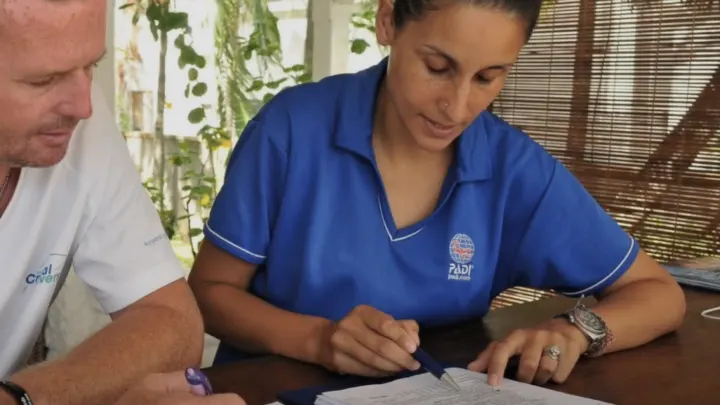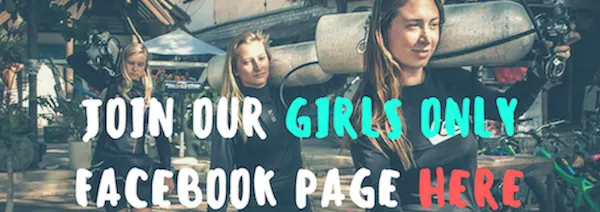The first step in applying for any new job is getting your resume prepared to send to an employer. It’s exactly the same for diving jobs, but writing a scuba diving CV can be a little different from resumes you’ve put together in the past. Whether you’re fresh out of your IDC or a more accomplished instructor, we could all benefit from the wisdom of others when writing a diving resume.
Luckily for you, we’ve pulled together 10 tips to make your scuba diving CV stand out from three working dive professionals in the Girls that Scuba community. Read on to hear from Emma, Chi and Irene on how selling your diving and non-diving skills, personalising your CV, and celebrating your individuality will help you land your dream scuba job.
Our first tips come from accomplished dive professional Emma Andrews, who is a PADI Master Instructor and currently works as Business Development Manager at Crystal Divers Mauritius.
1. Do your research to apply for the roles which suit you best
Emma is a firm believer that not every scuba job will suit every applicant, so it’s important to take the time to choose the roles which are a good match for you. She told us: “The first step that you can take to help yourself stand out as a strong candidate for a job is to apply for positions that speak to and work for you. You alone know your skill set, personality, career goals and aspirations better than anyone, so apply for jobs that align with what you’re looking for, as well as your experience. Don’t send a one-size-fits-all generic application to any and all companies you can think of. The scuba diving industry is so unique because every company is individual and different. So take some time for yourself to set some goals, create a personal and professional growth plan and do your research.”
Once you’ve eliminated the roles which don’t match your goals, personalising your application is hugely appreciated by employers like Emma. “Something that hugely stands out for example, is the difference between a ‘Hello Emma’ or ‘To Whom it May Concern’ type of email greeting. The first candidate has taken some time to do their research, the second is a little more indifferent, and likely to be sending out as many applications as they can, to as many different companies in the hope of striking it lucky. We want committed, loyal and savvy individuals to come and work with us.”
2. Celebrate your personality with multimedia CVs
Whilst paper resumes still have their place, we don’t have to be restricted to the written word anymore when it comes to selling ourselves to prospective employers. Emma suggests: “Promote who you are and what you’ve achieved so far in a way that reflects your personality, but also in a way that shows you can be dynamic, innovative and connect meaningfully with people. Think outside the box.”
“Why not submit a video version of your CV, or an interactive visual version? Perhaps ask previous students, clients and colleagues to compile a short video of your best qualities, and some reasons why they enjoyed working with you.” We love this recommendation as a surefire way to distinguish yourself from other candidates.
3. Sell your skills as a full package
“Thirdly, create a lasting impression with prospective employers. Showcase and describe not only why you have the necessary skills and qualities they are looking for, but also that you can offer an additional skill set to help them market and develop their business. Some of the more compatible skill sets would include photography and videography, social media use and marketing, graphic and website design, and a teaching background for example. But don’t overlook or underestimate any of your achievements. Spin them in to a positive, unique selling point. Remember that you are and can be an incredible asset to the right company.”
We especially love the positivity of Emma’s final remarks; there will always be a dive shop which is a great fit for you and your unique skills, it’s just a matter of finding the right one! Our Female Dive Jobs Facebook Group is a fantastic resource if you’re looking for the perfect role for you in the scuba world.
4. Think about non-diving skills which are applicable to the role
The next dive pro offering up their CV wisdom is Chi Felton, also known as The Scuba Mermaid. Chi is an instructor at both recreational and technical levels, and she is extremely experienced in reviewing prospective employees thanks to her current role running a technical dive facility in Bunaken National Park, Indonesia.
If your dive experience is a little more limited or you’re a newer qualified instructor, your skills from other job experiences can still apply to the scuba world. Chi told us: “Although your dive credentials are essential to include on your CV, there are many other non-diving skills that could be relevant to the job application. Some of the more obvious ones include what languages you speak, whether you have experience in basic computer programmes like Excel, or if you have a good sales track record, but it’s the not so obvious ones that will help you get noticed.”
5. Celebrate your niche skills
Much like Emma, Chi values skills which are closely compatible with diving, but she offers up a great reminder to share why these niche skills are beneficial to the employer. She shared with us: “The directly applicable-to-dive-centre skills such as photography and photo editing, equipment or compressor handling and marine science qualifications will most likely be what potential employers will already be on the lookout for, however, the more niche your skillset is, the less competition you will have.”
“For example, do you have social media marketing, web development or SEO experience? You could use this to help the dive business increase and improve their online presence. If you have a medical background such as in nursing or paramedical? You could be an integral resource in the health and safety management of the business. Or do you have artistic skills? You could help design the company logo, or redesign the decor of the dive shop.”
6. Don’t sell yourself short, and keep learning!
If you’ve highlighted these skills on your CV, remember to put them in the right place on your resume and elaborate further as needed in an interview environment. Chi said: “It’s important to list your most relevant skills to the specific job or company you’re applying to, but don’t neglect to add a small bullet-point list of “additional skills” to your CV, and if you think it’s applicable bring it up during your interview. Potential employers may have not considered the many different ways you could be a valuable asset to their company, so it’s your job to not sell yourself short, and instead try to be proactive. Do your research, ask them directly, and in the meantime whilst you are still looking for work, try to expand and diversify your skillset.”
If you’d like to learn more from Chi, be sure to check out her comprehensive guide on how to write a scuba CV. Her section on what not to include is just as helpful as her practical tips on how to write your diving resume.
Our final CV tip contributor is one of our very own Girls that Scuba Ambassadors, Irene Marcoux. Irene is a PADI Course Director, and having also had experience as a dive shop assistant manager and a Human Resources professional, she’s seen a lot of CVs over the years. In her words, “the good, the bad, and unfortunately, the ugly.” Irene’s tips may seem simple on the surface, but “[she’s] seen too many making some very very simple avoidable mistakes”. Here’s what tops her tip list.
7. Skip the sloppy spelling mistakes
“Typos happen, and yes we are teaching scuba and not collegiate level languages. But DO NOT tell me you are focused and pay attention to details on your cover letter or CV, and have your resume be filled with spelling mistakes and typos. It shows you are not thorough and possibly sloppy. Have someone, or a few [people] verify your resume. If it’s clean and clearly written, it shows thought and preparation.”
8. A picture makes it personal
Whilst it’s not the case in every industry, many scuba employers like to see a professional looking photo on a diving CV. Irene gives some great insight into why this is the case: “Unless it is ‘illegal’ to include in your country, please add a photo of yourself, preferably smiling or at least looking approachable. No, it is not to weed you out based on looks, but if you hand in your resume in person, or even electronically, it already subconsciously creates a certain rapport/bond.”
9. Make it easy for the employer to understand
If you’re opting for a more traditional paper CV as opposed to Emma’s multimedia suggestion, Irene has some great advice to make it as simple as possible for the employer to get to know you.
“Try to keep it to one page, make it concise, and visually appealing. There are some great templates in Word or Google Docs; start from there and personalize them. Don’t give me three pages of your previous unrelated professional experiences. Do tell me right off the bat what position you are applying for, your dive specific experience, and then yes, please include brief past work experience, especially if it is relatable to a dive organization. When I first became an instructor I obviously had little to no dive teaching experience, but with my HR and business background I quickly found a management job where I was able to teach but also work with staffing and organization.”
10. Search for yourself on socials
Irene’s bonus tip is one we should all remember, no matter what industry we’re job hunting in! “Go over your social media and see what comes up when you look yourself up. Perhaps remove or make private photos of extremely fun evenings (wink wink), remove tags as required, update your LinkedIn. It is almost automatic now to go through a prospective employee’s social media presence. Remember, it might be your private life, but you will also be representing your new employer, and many customers will also look you up. I am not saying you need to live like a nun, please have fun, but be responsible.”
Most social media platforms give you the option to view your profile as it would appear to the general public, so make use of this to see what elements of your online presence you might need to change.
What top tips have landed you your dream scuba diving job? Share them in the comments below, start the discussion with our Facebook community of 50,000+ female divers, or tag us in your scuba career stories on Instagram!


